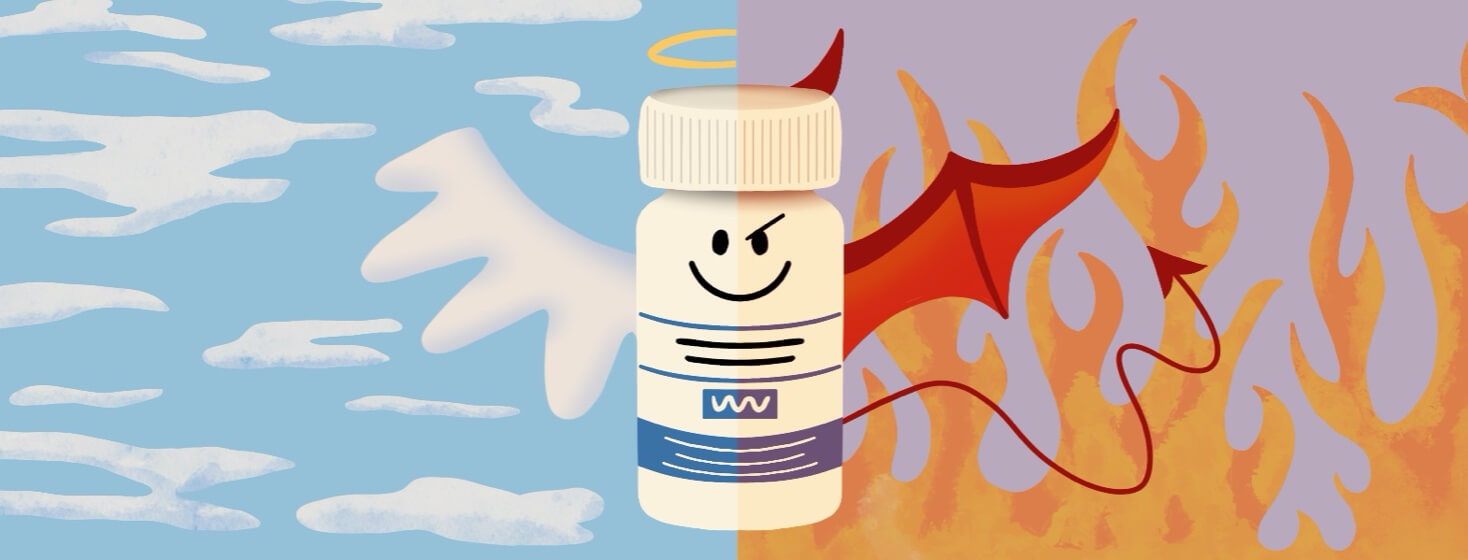Drug Interactions and RLS
Prescription and over-the-counter drugs can affect the symptoms of restless legs syndrome (RLS). But which ones will make your RLS worse and which will help? Read on for some details.
Medicines that worsen RLS symptoms
Some drugs you might be taking have been shown to trigger RLS symptoms or make them worse. Talk to your doctor if you take any of the following:
Antinausea drugs or drugs that control nausea and vomiting, such as:1
- Prochlorperazine
- Metoclopramide
Antipsychotic drugs, especially drugs made from haloperidol or phenothiazine. Doctors prescribe these drugs to treat schizophrenia and other mental illnesses.1
Antidepressants treat depression and other illnesses. If you have RLS, avoid antidepressants that boost serotonin and/or those known to worsen RLS symptoms, including:1-3
- Fluoxetine
- Sertraline
- Mirtazapene
An exception to these is buproprion, which should be considered for treating depression in RLS patients, according to the most recent guidelines.2
Cold and allergy drugs, particularly ones like diphenhydramine that have older antihistamines. Both prescription and over-the-counter drugs that treat colds and allergies can have this ingredient. Benadryl® is one.1-3
Over-the-counter sleep medicines that contain the supplement melatonin. Melatonin has been shown to cause worsening RLS symptoms.3
No natural or over-the-counter medications have been shown to consistently improve RLS.3
Other substances such as alcohol, caffeine, and nicotine can worsen RLS. Researchers are still studying the reasons behind the connection.1,2
Drugs that improve RLS symptoms
Over the years, experts have discovered new treatments for RLS – some originally meant for other health conditions. Here is a look at some of them:
Iron supplements
If blood tests show you are low on the proteins that store and transfer iron (ferritin and transferrin), your doctor will likely suggest iron supplements. You can get iron supplements over the counter to take by mouth. You may need to get iron through a vein (intravenously or IV) if taking it by mouth:1,2,4
- Does not ease your RLS symptoms
- Is not possible because of another medical condition
Antiseizure medicines
Doctors will sometimes prescribe antiseizure drugs to treat RLS. Currently, the US Food and Drug Administration (FDA) has only approved gabapentin enacarbil for RLS, but there are other antiseizure drugs that are also prescribed “off-label” for RLS. Off-label means that prescribing these drugs for RLS is not authorized by the FDA. These drugs include:1-3
- Gabapentin
- Pregabalin
- Carbamazepine (Tegretol®)
- Topiramate (Topamax®)
Dopaminergic drugs
Mostly used to treat Parkinson’s disease, this class of drug may also relieve RLS symptoms. FDA-approved drugs for moderate to severe RLS include:1,3
- Ropinirole (Requip®)
- Pramipexole (Mirapex®)
- Rotigotine (Neupro®)
Doctors also prescribe the combination drug carbidopa and levodopa (Sinemet®) off-label for treating RLS.1,3
Opioids
If your RLS symptoms do not improve with other medicines, opioids are another option. People living with a severe form of RLS may have their doctors prescribe:1,3
- Methadone
- Morphine
- Codeine
- Hydrocodone
- Oxycodone
- Propoxyphene
Prescription sleep medicines
RLS can cause sleep problems, so your doctor may prescribe drugs for better sleep. Drugs that can help you sleep include benzodiazepines or drugs that mimic them, such as:1,2
- Clonazepam
- Lorazepam
- Zaleplon
- Zolpidem
- Temazepam
- Eszopiclone
These medicines usually treat insomnia and other health conditions.1,2
Treatments under review for RLS symptoms
Scientists continue to look at new ways to treat RLS. Here are a few that researchers have studied and what they found:
Botulinum toxin
There’s no solid proof that botulinum toxin (Botox®) helps to ease RLS. Some studies show injecting it into your leg muscles may work to treat RLS, but other research does not show the same effects.2
Cannabis
Some people living with RLS say cannabis has a positive impact on relieving their condition. So far, there has not been extensive scientific research on the topic. Scientists need to examine the method, dosage, and other factors before they know for sure whether cannabis is an effective treatment.2
Vitamins and minerals
While there is little to no evidence that vitamins and minerals besides iron help treat RLS, some patients have reported that certain supplements have helped:2,3
- Calcium
- Magnesium
- Vitamin E
- Vitamin C
Talk to your doctor about any medications you are taking, including over-the-counter drugs or vitamin supplements, to ensure that your treatment regimen is free of unwanted and potentially unsafe drug interactions.

Join the conversation